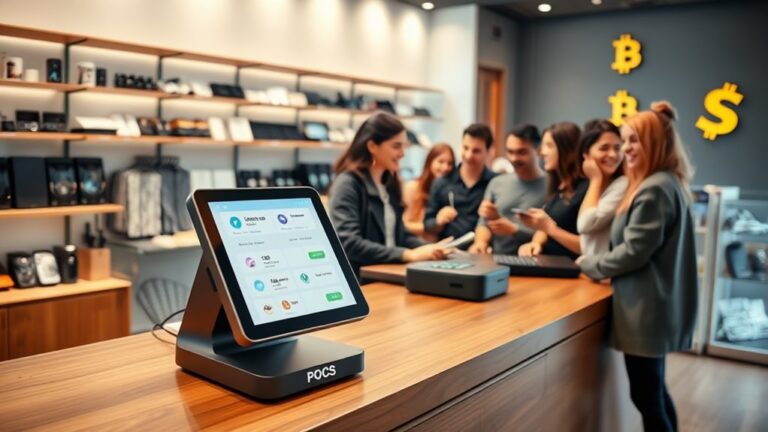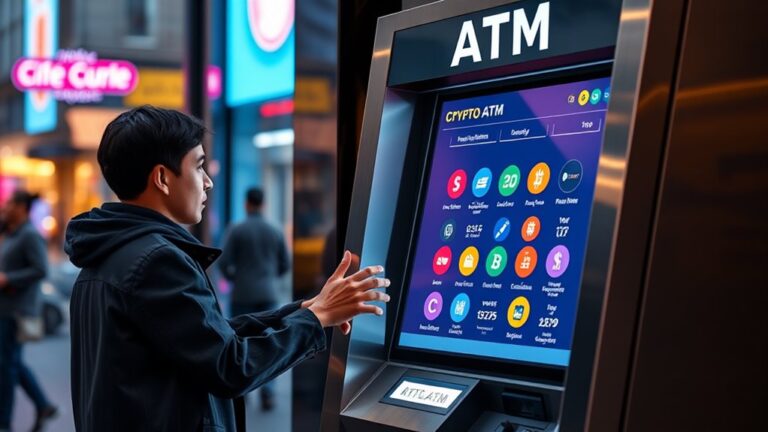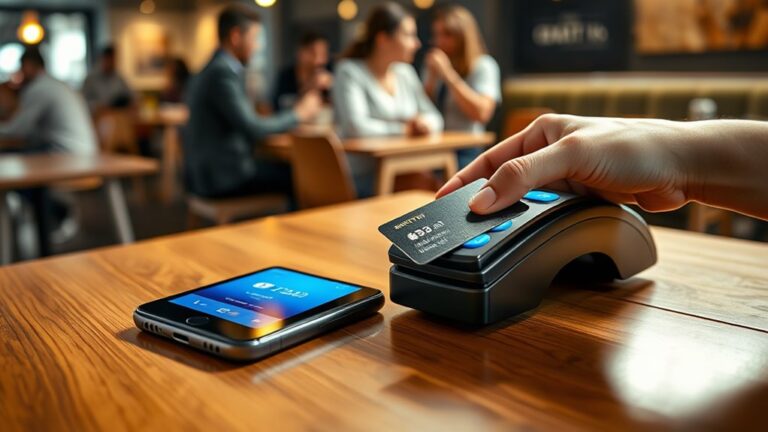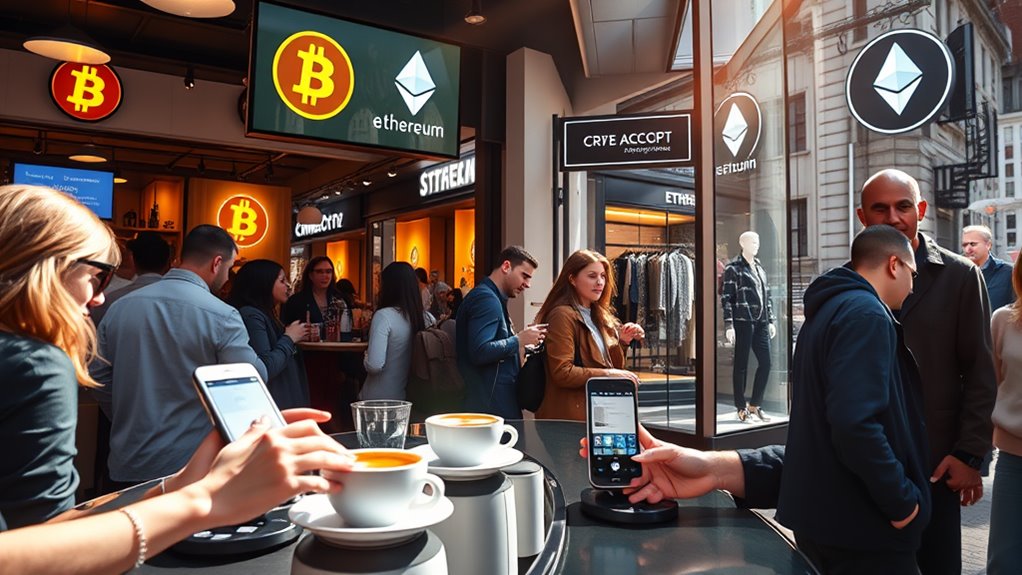
Businesses That Accept Crypto: 10 Top Companies for Secure Payments
Several major companies accept cryptocurrency payments, enhancing transaction security and convenience. AT&T leads in telecom, while CheapAir and Travala.com innovate in travel by allowing Bitcoin and other digital payments. Overstock and Microsoft have embraced e-commerce through crypto, providing easy options for consumers. Retailers like Home Depot and AMC Theatres enable customers to pay with Bitcoin. Additionally, Tesla’s acceptance of Dogecoin showcases the growing trend. Understanding these businesses highlights the evolving landscape of secure transactions in commerce.
Key Takeaways
- AT&T accepts Bitcoin and Bitcoin Cash through BitPay, converting transactions to traditional currency for ease of use in their app and online accounts.
- CheapAir has been accepting Bitcoin since 2013 and now processes payments in multiple cryptocurrencies, enhancing efficiency with BTCPay.
- Overstock, a pioneer in retail crypto adoption, accepts various digital currencies and invests in blockchain through Medici Ventures.
- Microsoft allows Bitcoin payments for digital content, though there are daily transaction limits and restrictions on direct purchases.
- AMC Theatres integrates cryptocurrency for ticket purchases, with a significant portion of online transactions conducted in digital currencies via BitPay.
AT&T: Leading Telecom Provider Embracing Bitcoin
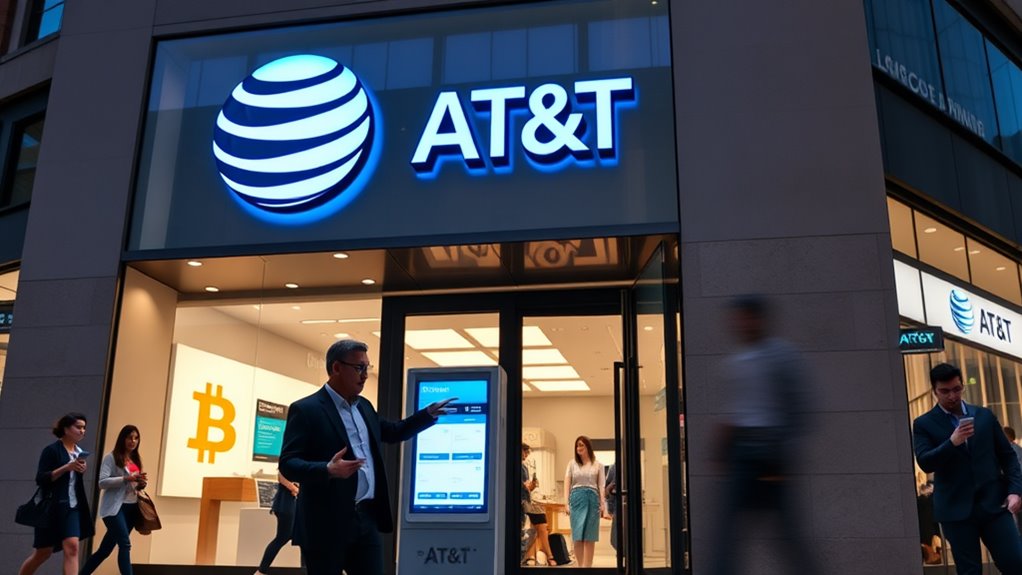
AT&T stands out as a pioneering telecom provider in the United States, particularly becoming the first major company in its sector to accept cryptocurrency payments. This innovation is facilitated through a partnership with BitPay, which allows customers to pay using Bitcoin and Bitcoin Cash.
BitPay manages the transactions, converting cryptocurrencies into traditional currency for AT&T. Payments can be made conveniently via the myAT&T app or online accounts, enhancing the overall customer experience.
This strategic move not only reflects AT&T’s commitment to adapting to consumer preferences but also positions the company as a leader in the telecom industry. By embracing cryptocurrency, AT&T aims to provide more flexible payment options and cater to the growing number of cryptocurrency users. Additionally, this partnership highlights the importance of crypto payment gateways in facilitating secure and efficient transactions for businesses.
Cheapair: Revolutionizing Travel With Crypto Payments

In the travel industry, CheapAir has emerged as a pioneer by accepting cryptocurrency payments, making it one of the first travel agencies to embrace this digital currency.
Beginning in 2013, CheapAir initially accepted Bitcoin and later expanded to include Ethereum, Litecoin, and stablecoins like USDC and GUSD. The company processed over $5 million in Bitcoin payments, showcasing its commitment to innovation.
By shifting from Coinbase to BTCPay, CheapAir enhanced payment processing efficiency. Crypto payments offer benefits such as enhanced security, lower transaction fees, and global accessibility. Integrating cryptocurrency payments can not only streamline transactions but also position businesses at the forefront of digital payment innovation.
CheapAir’s switch to BTCPay boosts payment efficiency, providing secure, low-cost, and globally accessible crypto transactions.
While challenges like market volatility and varying refund policies exist, CheapAir’s focus on customer satisfaction has fostered loyalty within the cryptocurrency community, ensuring a positive travel experience for users.
Overstock: Pioneering E-commerce in the Crypto Space

Overstock has established itself as a leader in the e-commerce sector by being one of the first major retailers to accept cryptocurrency payments, beginning with Bitcoin in 2014.
The company has since expanded its offerings to include various cryptocurrencies, enhancing the shopping experience for customers while promoting wider adoption.
Through partnerships and innovative solutions, Overstock continues to pave the way for integrating digital currencies into everyday transactions. Additionally, Overstock’s commitment to enhancing the efficiency of crypto payments aligns with trends in the industry that seek to simplify and stabilize these processes for consumers.
Early Adoption of Crypto
As the cryptocurrency landscape began to take shape, Overstock emerged as a pioneering force in the e-commerce sector by accepting Bitcoin in 2014. This decision positioned Overstock as one of the first major retailers to embrace digital currency, partnering with Coinbase to facilitate transactions.
In the same year, the company launched Medici Ventures, focusing on blockchain investments. Initially, cryptocurrency transactions contributed a small portion of revenue, but this segment grew considerably over time.
Overstock’s early acceptance of crypto payments not only boosted its market value but also influenced other companies to explore similar options. By integrating blockchain technology, Overstock set a precedent for innovation and financial engagement in the evolving digital marketplace. As regulations evolve, consumer protection efforts are becoming increasingly important for businesses accepting cryptocurrencies, further shaping the landscape for digital assets.
Diverse Cryptocurrency Options
With the rise of digital currencies, e-commerce businesses have begun to explore diverse cryptocurrency options to cater to a growing customer base.
Overstock stands out by accepting multiple cryptocurrencies, including Bitcoin, Ethereum, and Litecoin, through its partnership with ShapeShift. This collaboration allows customers to convert between different cryptocurrencies during checkout, enhancing flexibility.
The acceptance of various digital currencies helps mitigate risks associated with market volatility, offering alternatives to traditional options. Additionally, Overstock’s integration of blockchain technology guarantees secure and transparent transactions. Furthermore, by leveraging stablecoins’ stability, Overstock is able to provide customers with a reliable medium of exchange that facilitates seamless transactions.
Enhanced Shopping Experience
The enhanced shopping experience offered by companies like Overstock represents a significant shift in the way consumers engage with e-commerce. Since becoming the first major retailer to accept Bitcoin in 2014, Overstock has focused on integrating blockchain technology to improve transaction security and privacy.
By utilizing cryptocurrencies, customers benefit from faster transaction times and reduced fees compared to traditional payment methods. Overstock’s dedicated team of blockchain developers continually works to advance these capabilities, ensuring a seamless shopping experience. Additionally, the company offers various cryptocurrencies and international shipping, allowing a broader range of customers to participate. Overall, Overstock’s commitment to innovation positions it as a leader in the evolving landscape of digital commerce, enhancing user convenience and security. Furthermore, the use of crypto payment processors facilitates reduction in transaction fees, making it an attractive option for both the company and its customers.
Microsoft: Digital Content Payments Made With Bitcoin

Microsoft has been a pioneer in integrating cryptocurrency into its digital content payment system, particularly through its acceptance of Bitcoin. Since December 2014, the company has allowed users to add funds to their Microsoft accounts using Bitcoin, primarily for digital purchases.
Key aspects of this integration include:
- Payment Limitations: Bitcoin can only be used to top up accounts, not for direct purchases.
- Transaction Cap: Users can add up to $1,000 daily and $5,000 per account.
- Content Availability: Payments are accepted for apps, games, and videos on platforms like Xbox.
- Security and Transparency: Bitcoin transactions are secure and irreversible, emphasizing caution in usage.
These measures reflect Microsoft’s long-term strategy to embrace digital currencies in its operations.
Home Depot: Innovating Retail With Bitcoin Acceptance
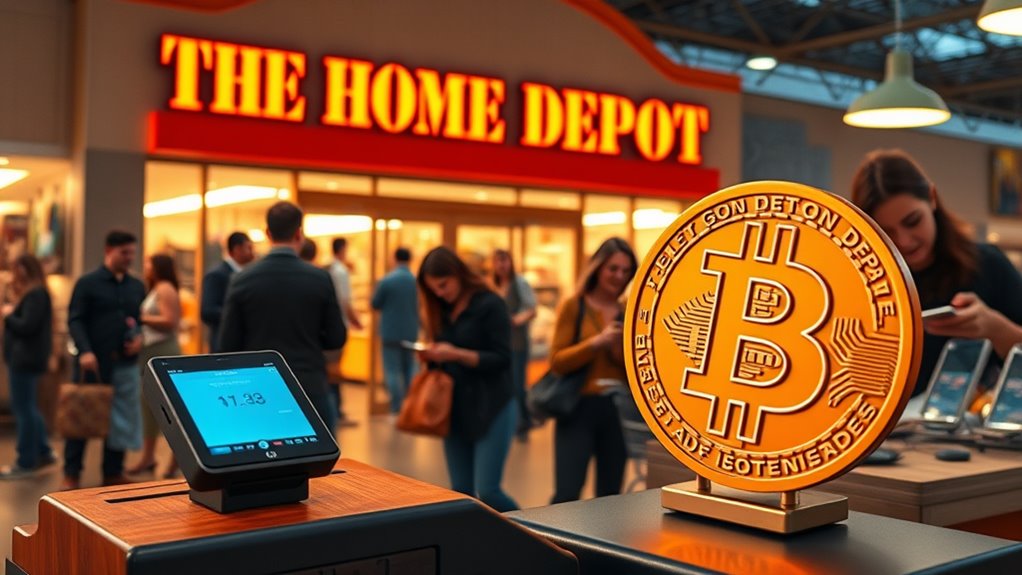
Home Depot, recognized as the largest hardware store chain in the United States, has begun exploring the integration of cryptocurrency into its retail operations.
With over 2,000 locations across North America, the company mainly focuses on home improvement products. Home Depot has reported utilizing Flexa systems to facilitate Bitcoin payments. When customers choose to pay with Bitcoin, Flexa converts the cryptocurrency into U.S. dollars at checkout, reducing volatility risks.
Home Depot is leveraging Flexa systems to enable Bitcoin payments, minimizing volatility risks at checkout.
Additionally, customers can purchase Home Depot gift cards using cryptocurrency through platforms like Bitrefill. This innovative approach not only offers a secure transaction environment but also attracts customers interested in digital finance. Furthermore, customers can benefit from reduced transaction costs when using Bitcoin, enhancing their overall shopping experience.
While direct Bitcoin acceptance is limited, Home Depot’s exploration of crypto payments indicates potential for future growth and flexibility in the market.
Airbaltic: Airlines Taking Flight With Bitcoin Transactions

As airlines seek innovative ways to enhance customer experiences, AirBaltic has emerged as a trailblazer by accepting Bitcoin and other cryptocurrencies for flight payments since 2014.
This pioneering decision positions AirBaltic as a leader in the aviation industry, offering travelers increased flexibility and appealing to tech-savvy customers.
The airline accepts a variety of cryptocurrencies, including:
- Bitcoin
- Ethereum
- Dogecoin
- Bitcoin Cash
Transactions are securely processed through BitPay, which converts payments into Euros, eliminating the need for AirBaltic to hold cryptocurrency.
This initiative not only enhances customer experience but also sets a precedent for other airlines considering similar payment options, showcasing the potential for increased adoption of digital currencies in travel. Additionally, utilizing a secure payment processor like centralized exchanges can further ensure the safety of transactions and customer data.
AMC Theatres: Moviegoers Enjoying Crypto Payment Options
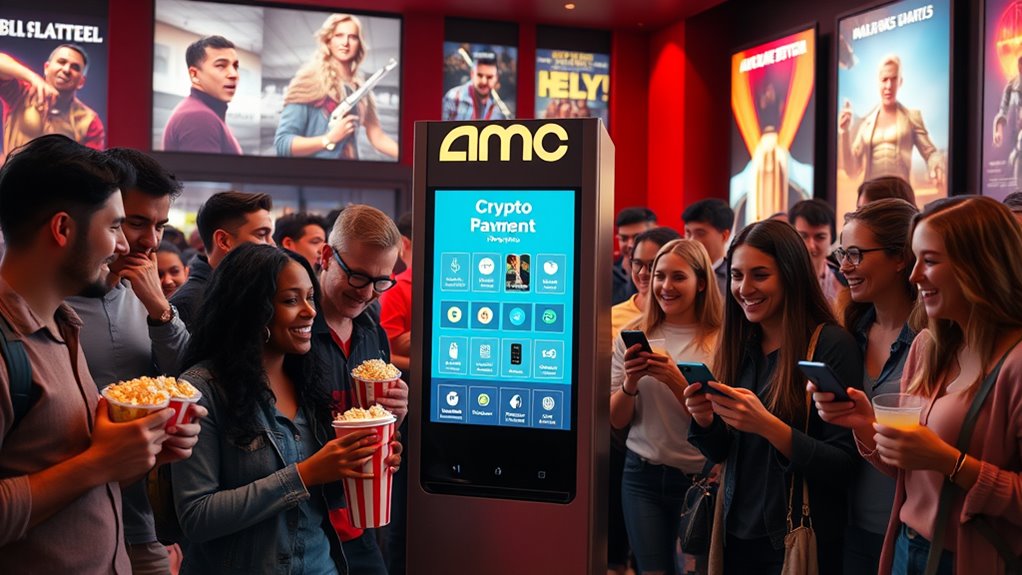
AMC Theatres has begun accepting Bitcoin for ticket purchases, offering a new payment option for moviegoers. This seamless payment experience allows customers to use various cryptocurrencies, enhancing convenience and accessibility. As AMC continues to expand its crypto options, it aims to engage a broader audience in the entertainment sector. By integrating crypto debit cards, users can easily convert their digital assets into spendable currency at the box office.
Bitcoin Ticket Purchases
With the rise of digital currencies, moviegoers now have the option to purchase tickets using Bitcoin and several other cryptocurrencies at AMC Theatres. This innovative approach aligns with AMC’s strategy to attract a growing base of crypto-savvy customers.
Key features of this system include:
- Cryptocurrency Variety: AMC accepts Bitcoin, Dogecoin, Ethereum, Litecoin, Bitcoin Cash, and Shiba Inu for online ticket purchases.
- User-Friendly Access: Customers can conveniently use these cryptocurrencies through the AMC website or mobile app.
- Market Impact: Shortly after implementation, approximately 14% of AMC’s online transactions involved cryptocurrency.
- Global Presence: While AMC operates nearly 1,000 theaters, crypto payments are currently limited to customers in the United States.
This development marks a significant shift in how tickets can be purchased in the entertainment industry. Moreover, this adoption reflects the growing trend of institutional adoption in the cryptocurrency market, as more businesses recognize the potential of digital currencies.
Seamless Payment Experience
The integration of cryptocurrency payments at AMC Theatres offers moviegoers a seamless payment experience, enhancing convenience and accessibility.
By partnering with BitPay, AMC provides a user-friendly interface on its website and app, allowing customers to select crypto as a payment option during checkout. This feature supports over 100 digital wallets, making transactions straightforward for various users.
Additionally, AMC offers digital gift cards that can be purchased with cryptocurrencies, further simplifying the process. Payments are settled in fiat currency, mitigating volatility risks commonly associated with digital currencies.
With options to use both crypto and traditional payment methods, AMC caters to a diverse customer base, ensuring a smooth and flexible payment experience for all moviegoers.
Expanding Crypto Options
As the demand for cryptocurrency continues to rise, many businesses are adapting to meet the preferences of their customers, and AMC Theatres is no exception.
The company has made significant strides in expanding its crypto payment options, enhancing customer experiences with the following features:
- Crypto Variety: AMC accepts a range of cryptocurrencies, including Bitcoin, Ethereum, Litecoin, and Dogecoin for digital gift cards and purchases.
- Convenient Transactions: Integration with BitPay allows seamless transactions through the AMC mobile app.
- Customer Engagement: Over two-thirds of AMC customers support the acceptance of meme coins like Dogecoin.
- Growing Popularity: Crypto payments accounted for 14% of AMC’s total online transactions, reflecting a growing trend in the entertainment industry.
Expressvpn: Securing Online Privacy With Cryptocurrency

ExpressVPN stands out in the digital landscape by prioritizing online privacy and security through its acceptance of cryptocurrency payments. By allowing users to pay anonymously with Bitcoin, Ethereum, and various stablecoins, ExpressVPN enhances the privacy of its customers.
This VPN service operates servers in over 105 countries, ensuring fast and secure connections for users globally. Its technology features, such as a kill switch and TrustedServer technology, further reinforce security.
The checkout process for cryptocurrency payments is straightforward, enabling users to select BitPay for their transactions. Overall, ExpressVPN’s integration of cryptocurrency not only facilitates secure payments but also appeals to individuals seeking to maintain their anonymity while browsing the internet.
Travala.Com: Transforming Travel Bookings With Blockchain

With the rise of cryptocurrency, Travala.com has emerged as a pioneering force in the travel booking industry since its founding in 2017. This platform is dedicated to increasing crypto adoption in travel through blockchain technology.
Travala.com operates in over 230 countries and provides access to more than 90,124 destinations globally.
Key features include:
- Diverse Payment Options: Accepts over 100 cryptocurrencies alongside traditional payment methods.
- Tokenized Incentives: Rewards users with AVA tokens through their Smart Program.
- Best Price Guarantee: Guarantees competitive pricing on accommodations and activities.
- Extensive Travel Offerings: Lists over 2,200,000 properties and 400,000 activities worldwide.
Tesla: Driving Innovation With Dogecoin Payments
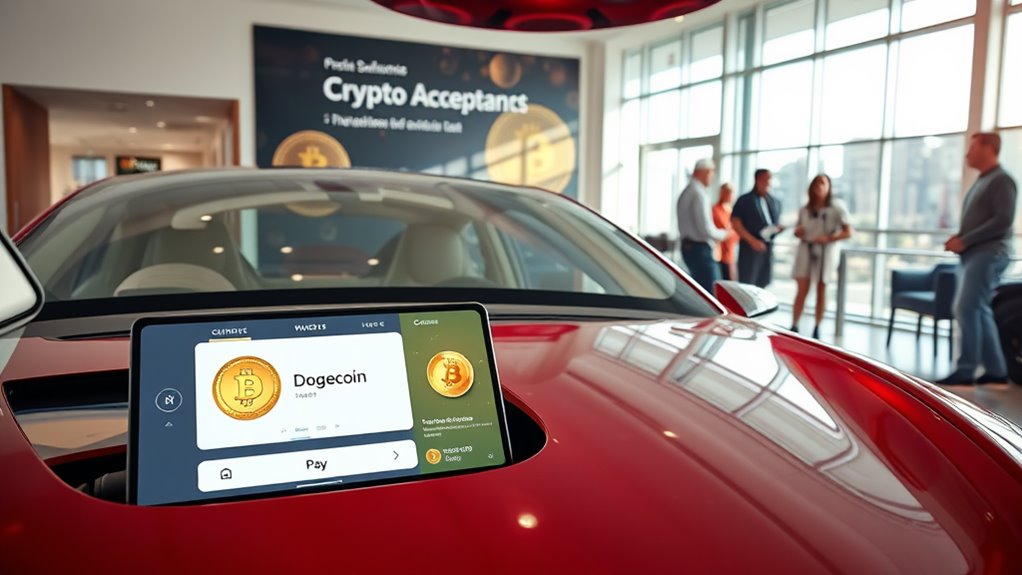
Tesla has integrated Dogecoin as a payment method for select merchandise on its online shop, showcasing its commitment to innovation in digital payments.
This integration has not only introduced new product offerings priced in Dogecoin but also led to a notable response from the market, including a significant increase in Dogecoin’s value.
As the cryptocurrency community reacts positively to Tesla’s adoption, the potential for broader use of Dogecoin in future transactions remains a topic of interest.
Dogecoin Payment Integration
As businesses increasingly explore the integration of cryptocurrencies, Tesla has taken a significant step by accepting Dogecoin as a payment option for select merchandise on its website. This integration highlights the growing acceptance of digital currencies.
Key details include:
- Eligible Products: Certain Tesla merchandise is available for purchase using Dogecoin, with prices sometimes displayed in DOGE.
- Transaction Processing: Payments may take from one minute to six hours to process, depending on network conditions.
- Security Responsibility: Customers must guarantee accurate transfers to Tesla’s Dogecoin wallet, emphasizing the importance of secure transactions.
- Market Impact: Following this integration, Dogecoin’s price surged over 35%, indicating increased investor confidence and market activity.
Tesla’s move may set a precedent for broader cryptocurrency adoption in e-commerce.
Innovative Product Offerings
The integration of Dogecoin payments has allowed businesses to rethink their product offerings, with notable implications for the retail experience.
Tesla has taken a pioneering step by accepting Dogecoin for select merchandise, enhancing customer engagement. This move enables users to access Dogecoin-exclusive listings, simplifying transactions for tech-savvy consumers.
By adopting cryptocurrency payments, Tesla differentiates itself in the automotive sector, appealing to a demographic that values innovative financial solutions. Additionally, this strategy secures Tesla’s position within both the electric vehicle and cryptocurrency markets.
The acceptance of Dogecoin not only showcases Tesla’s commitment to modern payment methods but also reflects a broader trend of integrating digital currencies into mainstream commerce, setting a precedent for others to follow.
Market Response Impact
Shifting the landscape of financial transactions, the acceptance of Dogecoin payments has generated notable market responses, particularly within the automotive sector.
Tesla’s innovative move has influenced various areas, prompting discussions about cryptocurrency’s future in commerce.
Key impacts include:
- Market Influence: Tesla’s acceptance of Dogecoin led to significant price surges, highlighting its market power.
- Increased Legitimacy: Major companies adopting cryptocurrencies enhance their mainstream recognition and credibility.
- Environmental Considerations: Dogecoin’s energy-efficient nature offers a more sustainable payment alternative compared to Bitcoin.
- Customer Attraction: The integration of Dogecoin could draw new customers, potentially boosting sales and economic growth.
Frequently Asked Questions
What Cryptocurrencies Are Accepted by These Companies?
Various companies accept cryptocurrencies, including Bitcoin, Ethereum, Dogecoin, and Litecoin. Stablecoins like Tether are also utilized, particularly in specific locations. This broad acceptance reflects an evolving landscape for digital currency transactions across diverse industries.
Are There Transaction Fees for Crypto Payments?
Transaction fees for crypto payments vary by platform and can include network fees, processing fees, and flat rates. These fees often depend on transaction types, payment gateways, and trading volumes, influencing overall costs for users and businesses.
How Are Crypto Transactions Secured by These Businesses?
Crypto transactions are secured through cryptographic encryption, decentralized blockchain technology, and multi-signature wallets. Additionally, consensus mechanisms validate transactions while real-time monitoring systems detect threats, ensuring robust security against unauthorized access and fraud.
Can I Return Items Purchased With Cryptocurrency?
Returning items purchased with cryptocurrency is generally possible, but policies vary. Many businesses refund the equivalent cryptocurrency amount paid, while some may deduct transaction fees. Customers should verify specific return policies with individual merchants.
Is Customer Support Available for Crypto-Related Inquiries?
Customer support for crypto-related inquiries is widely available, often featuring 24/7 assistance through various channels. Knowledgeable teams help users navigate issues, enhancing confidence and satisfaction in their transactions within the evolving cryptocurrency landscape.
Conclusion
As cryptocurrencies continue to gain traction, these ten companies exemplify the growing acceptance of digital currencies in various sectors. Each organization, from telecom giants to innovative travel platforms, is paving the way for a new era of secure payments. Yet, the question remains: will this trend endure, or is it simply a passing phase? As consumers increasingly seek flexibility and security in their transactions, the future of crypto adoption remains uncertain, leaving room for both potential and intrigue.

